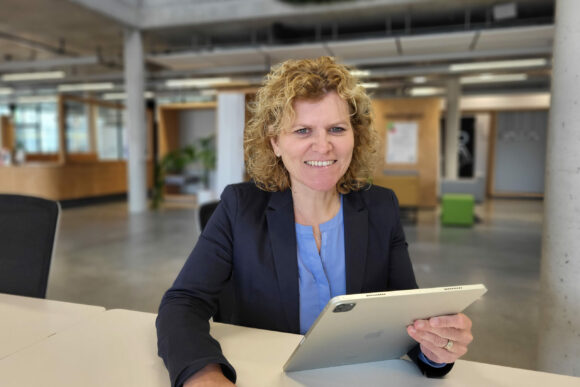The increasingly visible and tangible effects of climate change and the reaching and exceeding of planetary boundaries mean that companies are increasingly concerned with the question of how the ecological footprint of processes and products can be reduced. As part of a cooperative “Sustainability Management” course with HZ University in the Netherlands, students at Hof University of Applied Sciences are therefore currently researching innovative sustainability solutions for companies.

In the Sustainability Management module, students from the Business Administration and International Management courses are looking at the role of companies in sustainable development. They analyze and develop strategies, practices and innovations for sustainable management.
“In a globalized world, corporate activities have an international and global impact and must therefore take into account different framework conditions, stakeholders and perspectives.”
Tina Wiegand, Faculty of Business Administration and Economics at Hof University of Applied Sciences
In order to promote solutions here, she teamed up with Sylvia Schouwenaars, Ad de Wit and Marc Nohlmanns from HZ University in Vlissingen in the Netherlands. In the current summer semester, a total of 45 students from both universities are now working on the specific question posed by corporate partner Zeelandia – an internationally active company in the food industry – as to how it can efficiently measure and evaluate emissions along the supply chain (so-called Scope 3 emissions).

The partnership between the participating universities and industry not only demonstrates the partners’ commitment to interdisciplinary and international cooperation, but also enables the participating students to directly combine different skills. “Language skills and project management know-how are put to practical use for real-life challenges,” says Tina Wiegand.
Kick-off and first project week
The project began with an exciting online kick-off event on March 27, during which the corporate partner Zeelandia presented its corporate structure and the specific question for the students. In addition, the students from both universities got to know each other and were divided into mixed groups to work together on the questions. The project week then took place at Hof University of Applied Sciences from April 8 to 12. During intensive units, the students not only received lectures on relevant topics of sustainability management and greenhouse gas balancing, but also workshops on the methodology of design thinking, as well as project management and teamwork in an intercultural environment.

In addition to working on the company’s project objectives, the project week also gave the students the opportunity to get to know each other better and share common experiences. These included leisure activities such as a visit to the German-German Museum in Mödlareuth, an exciting brewery tour and relaxed evenings at the picturesque Untreusee lake. These shared experiences not only strengthened team spirit, but also provided space for informal exchanges and interpersonal relationships that are important beyond the project.
Return visit to Vlissingen in June
Over the next six weeks, the students will continue their work in their groups, connecting with each other via various online channels (such as Zoom, Moodle and Nextcloud). Despite the physical distance, they work intensively on the company project, regularly exchanging ideas and progress and receiving feedback and input from their coaches. On June 3, the group of Hof students will then set off for Vlissingen for the second project week. True to the idea of sustainability, the students will travel in an environmentally friendly way by train, supported by Erasmus funding.
In Vlissingen, the joint group work is finalized and the final presentations are prepared, which are then presented to representatives of the company. These presentations are not only an important step for the students to present their work, but also offer the opportunity to receive valuable feedback from experts from the industry. In addition to the intensive work, time is also set aside during this week for joint workshops and experiences. These not only provide the students with a welcome change of pace, but also promote team spirit and strengthen the interpersonal relationships that have developed during the project.










